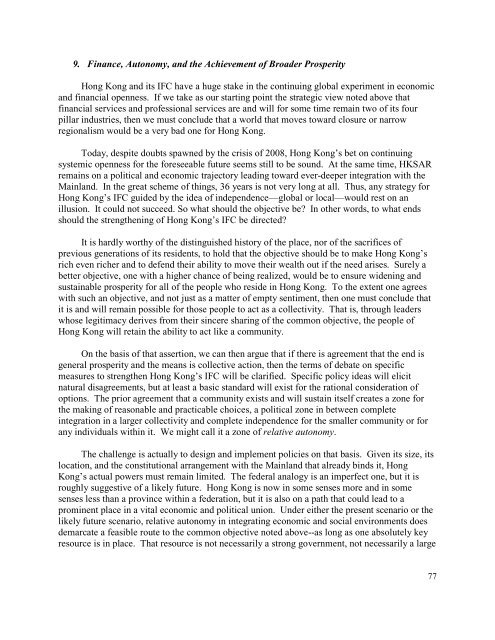Hong Kong's International Financial Centre: Retrospect and Prospect
Hong Kong's International Financial Centre: Retrospect and Prospect
Hong Kong's International Financial Centre: Retrospect and Prospect
Create successful ePaper yourself
Turn your PDF publications into a flip-book with our unique Google optimized e-Paper software.
9. Finance, Autonomy, <strong>and</strong> the Achievement of Broader Prosperity<br />
<strong>Hong</strong> Kong <strong>and</strong> its IFC have a huge stake in the continuing global experiment in economic<br />
<strong>and</strong> financial openness. If we take as our starting point the strategic view noted above that<br />
financial services <strong>and</strong> professional services are <strong>and</strong> will for some time remain two of its four<br />
pillar industries, then we must conclude that a world that moves toward closure or narrow<br />
regionalism would be a very bad one for <strong>Hong</strong> Kong.<br />
Today, despite doubts spawned by the crisis of 2008, <strong>Hong</strong> Kong’s bet on continuing<br />
systemic openness for the foreseeable future seems still to be sound. At the same time, HKSAR<br />
remains on a political <strong>and</strong> economic trajectory leading toward ever-deeper integration with the<br />
Mainl<strong>and</strong>. In the great scheme of things, 36 years is not very long at all. Thus, any strategy for<br />
<strong>Hong</strong> Kong’s IFC guided by the idea of independence—global or local—would rest on an<br />
illusion. It could not succeed. So what should the objective be? In other words, to what ends<br />
should the strengthening of <strong>Hong</strong> Kong’s IFC be directed?<br />
It is hardly worthy of the distinguished history of the place, nor of the sacrifices of<br />
previous generations of its residents, to hold that the objective should be to make <strong>Hong</strong> Kong’s<br />
rich even richer <strong>and</strong> to defend their ability to move their wealth out if the need arises. Surely a<br />
better objective, one with a higher chance of being realized, would be to ensure widening <strong>and</strong><br />
sustainable prosperity for all of the people who reside in <strong>Hong</strong> Kong. To the extent one agrees<br />
with such an objective, <strong>and</strong> not just as a matter of empty sentiment, then one must conclude that<br />
it is <strong>and</strong> will remain possible for those people to act as a collectivity. That is, through leaders<br />
whose legitimacy derives from their sincere sharing of the common objective, the people of<br />
<strong>Hong</strong> Kong will retain the ability to act like a community.<br />
On the basis of that assertion, we can then argue that if there is agreement that the end is<br />
general prosperity <strong>and</strong> the means is collective action, then the terms of debate on specific<br />
measures to strengthen <strong>Hong</strong> Kong’s IFC will be clarified. Specific policy ideas will elicit<br />
natural disagreements, but at least a basic st<strong>and</strong>ard will exist for the rational consideration of<br />
options. The prior agreement that a community exists <strong>and</strong> will sustain itself creates a zone for<br />
the making of reasonable <strong>and</strong> practicable choices, a political zone in between complete<br />
integration in a larger collectivity <strong>and</strong> complete independence for the smaller community or for<br />
any individuals within it. We might call it a zone of relative autonomy.<br />
The challenge is actually to design <strong>and</strong> implement policies on that basis. Given its size, its<br />
location, <strong>and</strong> the constitutional arrangement with the Mainl<strong>and</strong> that already binds it, <strong>Hong</strong><br />
Kong’s actual powers must remain limited. The federal analogy is an imperfect one, but it is<br />
roughly suggestive of a likely future. <strong>Hong</strong> Kong is now in some senses more <strong>and</strong> in some<br />
senses less than a province within a federation, but it is also on a path that could lead to a<br />
prominent place in a vital economic <strong>and</strong> political union. Under either the present scenario or the<br />
likely future scenario, relative autonomy in integrating economic <strong>and</strong> social environments does<br />
demarcate a feasible route to the common objective noted above--as long as one absolutely key<br />
resource is in place. That resource is not necessarily a strong government, not necessarily a large<br />
77


